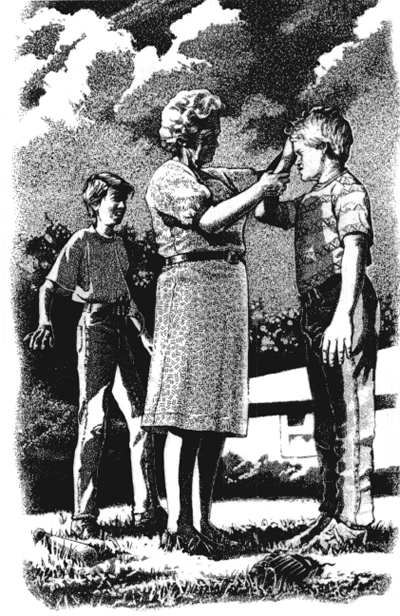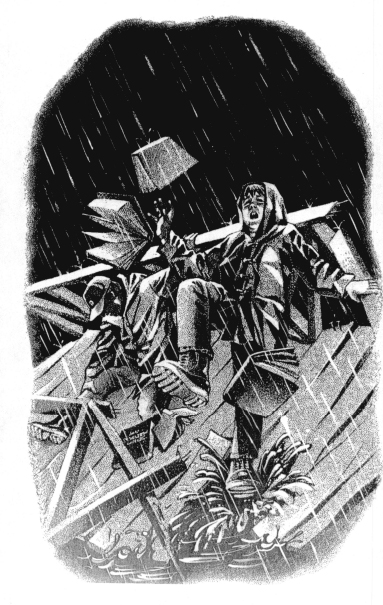Too Hot to Handle (3 page)
Authors: Matt Christopher

“No,” he said, and tried to shrug her arm off his shoulder. “I’ll be all right.”
“Stubborn like your father,” she said. “Here. Take your hands away. Let’s see that eye.”
He let her glimpse it.
“Heavens!” said Mrs. Finch. “You must let a doctor see that, David. Come on. I’ll drive you —”
“No. I’m all right now. I’ll put some ice on it.”
“David!” Mrs. Finch’s voice was raised almost to a shout. “If you don’t let me take you to a doctor I’ll call an ambulance
—”
She stopped, for just then a car had turned into the driveway. David looked with his good eye and saw that it was Dad.
Thank goodness! he thought.
D
AD looked at David’s eye.
“Yes, it was hit hard, Mrs. Finch,” agreed Dad. “But I’m sure I can take care of it with an ice pack.”
Mrs. Finch folded her arms disgustedly. “I’d say you both came out of the same pod,” she grunted. “Stubborn as mules, both
of you.”
Dad chuckled. “A miss now and then does a boy good, Mrs. Finch. The next time David will make sure he has the glove in front
of his eye before the ball gets there.”
He started toward the house with David.
“Mr. Kroft?”
Dad turned. “Yes, Mrs. Finch?”
“Do all of the lessons you teach your children involve this much pain?”
Dad smiled. “No, Mrs. Finch, don’t worry.”
Mrs. Finch glared at him a moment. Then she shook her head, laughed and struck her sides with her hands.
“I give up!” she cried. “I give up! Good-bye, and make
sure
you fix up that eye! You hear?”
With that she walked briskly away. David and Bonesy chimed in with Dad’s laughter, and the three of them went into the house.
“I can’t figure her out,” said David.
“Oh, she’s all right,” said Dad, as he went to the refrigerator and took out an ice tray. “She says she dislikes sports. She
wants the clubs she’s in to try to stop some of them. She wants more art in Penwood. High-class music, for example. And a
children’s theater.”
Bonesy whistled. “Guess she wants everything high-class!”
“Penwood could still have those things,” said
Dad. “All Mrs. Finch has to do is drum up more interest. I just don’t like her to step on our toes while she’s doing it, that’s
all.”
He put the ice into an ice bag and placed it against David’s swollen eye. The eye had already turned colors and was swollen
shut.
“Think I’ll be able to play baseball next Wednesday, Dad?” asked David anxiously.
“We’ll have to wait and see,” replied his father.
The day of the Flickers-Bluebirds game came, and David’s eye was better. The swelling had gone down, but it was still black
and blue.
David played third. The moment he faced the Bluebirds’ first hitter, a strange feeling came over him. He got to thinking about
his eye. He didn’t want to be afraid. He
couldn’t
be afraid.
He started up a continuous chatter and pounded his fist into the pocket of his glove. No ball was hit to him that inning.
In the next inning and the next he kept up the chatter.
In the fourth a high-bouncing grounder came to him. He caught it, whipped it to first and threw the runner out. He had a put-out
that inning, too. A pop fly in foul territory.
He felt better. His chattering had helped him forget about his eye and about being afraid of getting hit again.
The Flickers won the game 6 to 5.
On Friday they tangled with the Canaries. The Canaries had won their first three games. They were still hot as they played
the Flickers. Mandy Rubens, their clean-up hitter, smashed out a grand-slam home run. The game ended in the Canaries’ favor,
7 to 3.
That evening the sky darkened and thunder rolled. It started to rain, and it rained all night. It rained all day Saturday
and Sunday.
The baseball field was drenched. The Monday game between the Flickers and the Waxwings was postponed to July 22 — providing
the field
would be dry enough to play on then. David was sure that no games would be played that week. It was still raining Monday afternoon.
“I’m getting tired just sitting around and watching television,” said Don. “Want to walk to the library with me, David?”
“Sure,” said David.
They put on their boots and raincoats and went out into the rain. The Penwood Public Library was on another street, just beyond
a narrow wooden footbridge that crossed Indian Creek.
For a while they stood on the bridge and watched the water flowing underneath. It looked wild and dangerous. Up the creek
David could see the high falls in the distance. Never had he seen so much water come over the falls before.
The sight made him tremble. “Let’s go, Don,” he said.
They continued on to the library. Don picked up two adventure novels and two sports novels.

David selected a horse story and two books on baseball. They put the books underneath their slickers and started back for
home.
Partway over the bridge, Don suddenly stopped.
“David!” he said. “This bridge is moving!”
David noticed it, too. “Let’s run for it!” he shouted.
They started to run. They were nearly across when the bridge broke loose from its holdings in front of them. David felt the
wooden plankings give way under his feet and the cold water rush across his legs as he went down with the bridge.
He yelled with all the strength he had in his lungs. At the same time he let go of the books and grabbed hold of the railing.
In the next second the bridge tore loose at the other end and shot downstream. David turned and saw Don clutching the railing
desperately, too.
Don was on one knee. The railing from the other side was lying across his leg.
T
HE bridge was like a raft carrying the two boys down the stream. It bobbed and seesawed with the swiftly flowing water.
“David!” shouted Don. “Duck your head! We’re coming to a bridge!”
David had seen the bridge ahead of them. There were only a few feet of space between it and the flooding stream.
He ducked his head. This was going to be close. Real close!
Seconds later they were under it. There were only inches between the top of the railing and the bridge, but they passed safely
through.

David heard shouts behind him and looked back. A couple of cars had stopped on the street. People were jumping out of them,
pointing at the boys. Yelling.
The brothers had to pass under another bridge. Fear gripped David again. But they passed under this one safely, too.
Gradually the stream widened. The water became less bumpy. It didn’t splash over the bridge anymore. The ride was easier.
Less than a hundred yards away was the lake.
David saw Don lift the railing off his leg and heave it back. Then he saw Don rub his leg, saw the pain on Don’s face.
“You hurt bad, Don?” David asked worriedly.
“I don’t know,” said Don. “That railing hit me pretty hard.”
David raised himself with difficulty to his feet. When he stood at the railing, he could see that Don was favoring his hurt
leg.
A few minutes later they were out on the lake.
“Well,” smiled Don, “that was quite a ride. We’ll never forget this one, will we, David?”
David grinned with relief. “Wow! I guess not!”
They heard the sound of a motorboat. In a moment they saw it coming across the waters from Regent’s Boat Landing.
The boat came up close. There were two men in it. The boys knew them both. The one with a straw hat was Mr. Regent himself.
The other was Mr. Thomas, a man who worked at the landing.
They pulled up alongside the bridge. Mr. Thomas stood up and held on to the bridge railing while the boys got into the boat.
David hopped in easily. But Don had trouble. He couldn’t walk on his hurt leg. He got down on his knees and crawled backward
into the boat. David saw Don wince from the pain, but Don didn’t utter a peep.
“You boys had quite an experience,” said Mr. Regent, as he revved up the motor and headed
the boat back toward the landing. “Lucky you both weren’t thrown off. The waters are mighty dangerous up at the other end.”
“You can say that again,” replied Don.
“We lost our books,” said David.
“Books?” echoed Mr. Regent.
“Yes. We were just coming back from the library. I had three books and Don had four. We lost them all.”
“Don’t worry about them,” said Mr. Regent. “Books can be replaced. Your lives can’t.”
When they arrived at the landing, Mr. Regent and Mr. Thomas got on either side of Don and helped him out of the boat. An ambulance
was standing by, waiting for him. Don was laid on a stretcher and put into the ambulance.
“Can I go with him?” David asked the driver.
“You sure can,” said the driver.
“Will you please call my mother and tell her about this, Mr. Regent?” said Don. “And tell her not to worry.”
“Of course, my boy.” Mr. Regent smiled.
At the hospital, X rays were taken of Don’s leg. They showed that the bone just above the ankle was fractured.
Mom, Dad and Ann Marie were there. Mom had called Dad immediately at work after she had received the message from Mr. Regent
about Don.
“We’ll have to put a cast on that leg,” said Dr. Stevens, a small, chunky man with glasses. “And keep Don here for at least
a week. That isn’t bad at all, you know. Those boys were very lucky.”
“Will he — will he be able to play baseball anymore this year?” David asked worriedly.
The doctor smiled at him. “I’m afraid not, David. I guess you’ll be the only Kroft we’ll be watching the rest of this year.
Don will have to sit it out.”
W
HEN David woke up the next morning the sun was shining through the window. He leaped out of bed and pulled aside the curtains.
Below him the front lawn was green as a freshly scrubbed rug. A breeze was teasing the leaves of the big trees that lined
the street. How good it was to see the sun again!
He dressed quickly, went to the bathroom and washed. Then he hurried downstairs. He had reached the bottom when he remembered.
Don is in the hospital. His leg is fractured. He can’t play ball anymore this year.
Mom and Ann Marie were up. Ann Marie
was practicing the piano in the living room. Mom was at the telephone. She was telling someone about the bridge accident and
about Don’s being in the hospital.
That evening the paper had several pictures concerning the accident. One showed the place from which the bridge had been carried
away. Another was of the bridge floating out in the lake. There were also pictures of David and Don and a long article about
their hazardous journey down Indian Creek.
Penwood wasn’t the only town struck by the flood. Other small towns in the valley had been struck, too. Some much worse.
David worried about the library books. He spoke to Mom about them. She suggested that he telephone the library and tell them
he would pay for the books.
“Don’t worry about it, David,” said Ms. Benson, the librarian. “I’m just grateful you boys saved yourselves.”